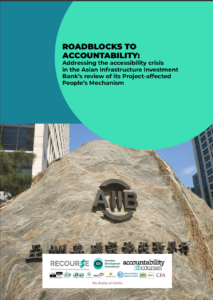Addressing the accessibility crisis in the Asian Infrastructure Investment Bank’s review of its Project-affected People’s Mechanism
 This report analyses the Asian Infrastructure Investment Bank’s Independent Accountability Mechanism, the Project-affected People’s Mechanism, now in its fifth year of existence and nearing its policy-mandated review. The objective of the report is to identify and set out the major challenges project-affected communities have faced in accessing remedy before the PPM so that they are addressed in the upcoming PPM review.
This report analyses the Asian Infrastructure Investment Bank’s Independent Accountability Mechanism, the Project-affected People’s Mechanism, now in its fifth year of existence and nearing its policy-mandated review. The objective of the report is to identify and set out the major challenges project-affected communities have faced in accessing remedy before the PPM so that they are addressed in the upcoming PPM review.
In particular, the report attempts to answer the question of why the PPM has not accepted a single complaint as eligible, despite the AIIB’s large portfolio of projects over the past seven years and several instances of negative environmental, social, and human rights impacts related to AIIB’s financing. The report finds that there is an accessibility crisis at the PPM where due multiple factors, such as excluding co-financed cases from the PPM’s mandate, lack of sufficient disclosure in financial intermediary investments, and policies around eligibility, among others, have led to the PPM being nearly inaccessible for project-affected communities. Overall, the report aims to ensure the AIIB addresses its ongoing accessibility crisis and closes accountability gaps in order to enhance its development effectiveness.
In order to explore barriers to accessibility and accountability, the report reviews evidence from several sources: the AIIB’s overall portfolio of projects, assessing which are eligible for the PPM and why many are not, comparing the portfolio before and after October 2021, when the AIIB’s new Environmental and Social Framework (ESF) came into force; the AIIB’s large and growing portfolio of financial intermediary projects, which pose particular challenges for accountability; three examples of AIIB projects and barriers to accountability that project- affected people have faced; and AIIB’s policies relating to accountability – including the PPM Policy and the Environmental and Social Framework (ESF). The report also compares the AIIB’s PPM to the accountability mechanisms of peer multilateral development banks on key policy areas around accessibility, independence, and remedy, proposing policy examples from international good practice at other multilateral development banks. Finally, the report makes practical suggestions for an inclusive and effective review process for the PPM.
It is essential that the PPM review recognise areas for reform both in the PPM policy and the Environmental and Social Framework, and other relevant policies such as the Policy on Public Information, as they relate to the issue of accessibility to and effectiveness of the PPM.
Read and download the full report here: Roadblocks to accountability
Centre for Financial Accountability is now on Telegram. Click here to join our Telegram channel and stay tuned to the latest updates and insights on the economy and finance.

